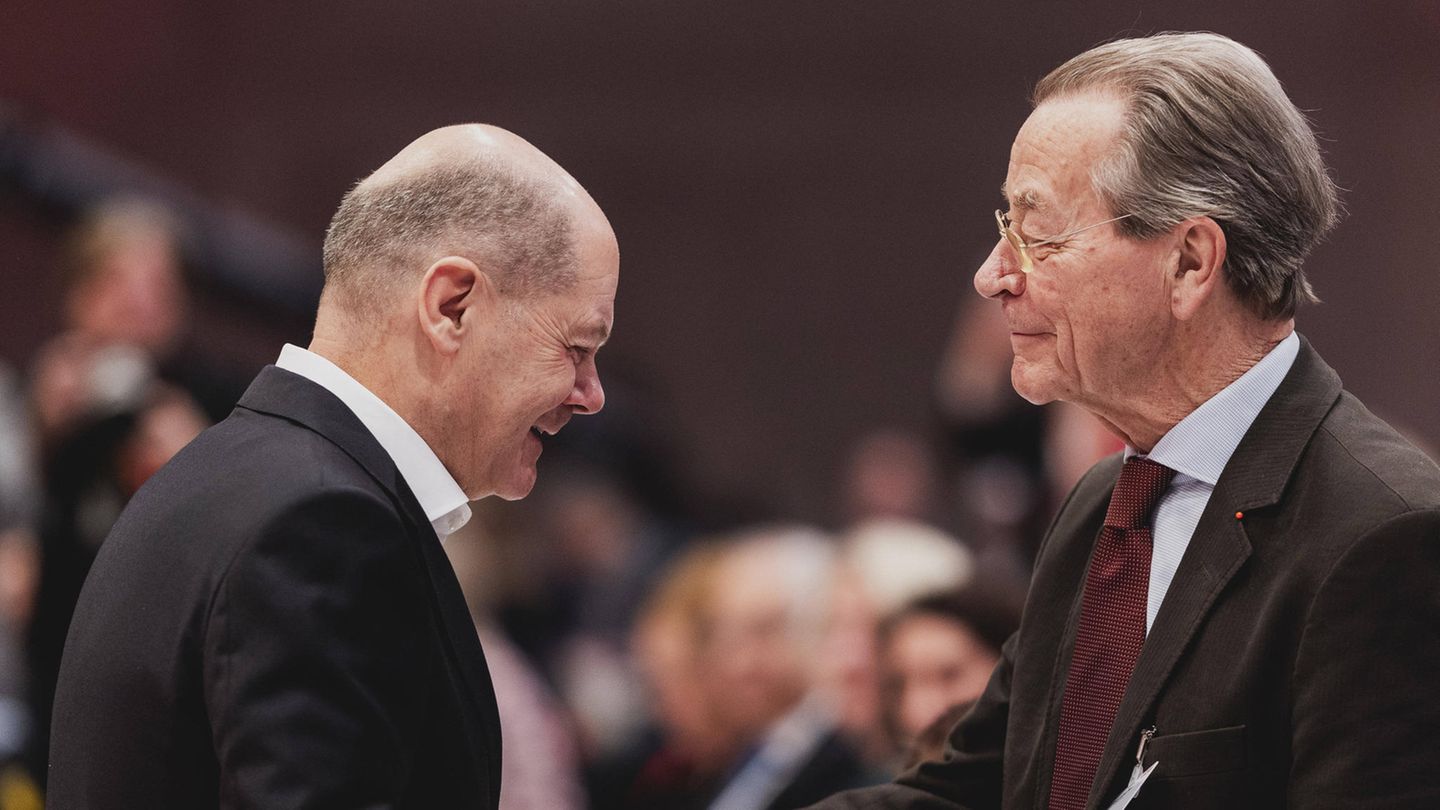Scholz on the hot seat? SPD veteran Franz Müntefering is giving new fodder to a sensitive issue that does not fit into the stressed party’s concept at all.
Opposition is rubbish, and Olaf Scholz agrees. After the disgrace of 2017, when the SPD achieved its worst result to date of 20.5 percent in the federal election, the party’s then vice-chairman quoted the legendary saying of an equally legendary Social Democrat. However, he added: “But opposition is part of democracy.”
Don’t panic, we’re still somebody, just don’t lose your nerve. That was the message. Even back then, Scholz was a practical optimist.
Now he is the Chancellor of a nervous party that once again feels like it is on the brink of polling. In a divided coalition that is really trying its best to scare off voters. In a crazy election year where everything could end in disaster, not least on the opposition bench. In this heated situation, one question seems to be an accelerant: Is it perhaps the boss’s fault?
It was raised by SPD veteran Franz Müntefering, a long-serving social democrat whose word carries weight in the party. After all, he has shaped it for years. As general secretary, party and parliamentary group leader, and labor minister. With the often-quoted sentence: “Opposition is rubbish.” The SPD wants to govern.
For Müntefering, the politician with a strong claim to power, the question of chancellor for the 2025 federal election has “not yet been answered,” as he told “Spiegel.” He spoke of “processes” that are taking place in the parties, including the SPD. “Then we will see what result we come to.”
The interim result: Suddenly the K question is back on the table – and there is unrest in the Willy Brandt House.
The speculation that Scholz could be replaced as the SPD’s candidate for chancellor is nothing new. The rumors are only getting more intense the more the situation for the party becomes more complicated. The chancellor is unpopular, the traffic light coalition is unpopular too, and there is (still) no sign of a trend reversal. This is fueling the imagination of some comrades to perhaps put another candidate into the race in the 2025 election campaign. One who might have more traction. Like Boris Pistorius, for example, the popular defense minister. Is party soldier “Münte” one of them?
There is a lot of irritation in the SPD, especially since Müntefering praised a “prudent” and “confident” chancellor in Markus Lanz’s talk studio just two days later, who was holding the disparate traffic light coalition partners together. “A completely different type of person than him could not manage it in such a constellation,” he said. So, what now?
Olaf Scholz and the K question: Not so bad?
Call to Ralf Stegner, another SPD veteran. “That’s typical Münte with his quirky, Sauerland humor,” the Bundestag member told the starMüntefering has never been one of those people who have instigated discord to the detriment of the party leadership.
“Every now and then, ‘the lone man’ might want to shake things up a bit,” Stegner says, interpreting the statements of the man who only knows the party but no party friends – and who therefore called himself the “lone man.” “The decision has not yet been formally made, Franz Müntefering is right about that,” Stenger agrees, “but Scholz is a given, there is no debate about him as a candidate for chancellor.”
So it’s not that bad? Not really.
In the SPD, which together have the potential to become an uncontrolled conflagration. Debt brake, conscription, industrial policy. Even in the minimum wage debate, the party is sending out different signals. In addition, sensitive questions are simmering, such as: Will the EU election, then the three state elections in East Germany go wrong? Will the coalition fall apart in the budget negotiations? The Chancellor’s party can’t use a personnel debate on top of that, and certainly not one about the party’s Chancellor.
It is therefore no wonder that the party leadership also wants the issue to be cleared up. Co-party leader Lars Klingbeil recently stated several times that Scholz is the SPD’s candidate for chancellor, as did General Secretary Kevin Kühnert, who scheduled Scholz’s official candidate selection for summer 2025. Even Popularity Minister Pistorius, who enjoyed the role of alleged reserve chancellor for a conspicuously long time, has now made it clear: “We have an excellent chancellor, and he will also be the next candidate for chancellor.”
The demonstrative support for Scholz is probably also due to the fact that not all of Scholz’s comrades have Scholz’s back. Recently, several SPD local politicians distanced themselves from the Chancellor, some of them by name: “Many at the SPD base say: Pistorius is clearly our number one,” said Heiko Wittig, SPD parliamentary group leader in the North Saxony district, to the “Tagesspiegel”. Jörg Laftidis, local association chairman in Bochum-Hamme, also complained that the Chancellor’s performance was “not the best.”
The inhibition threshold to publicly question Scholz’s suitability as chancellor is falling. Müntefering’s comments could contribute to an increase in the number of comments after the elections or in the budget tussle.
Scholz is chancellor and will remain so after the next federal election, says Jochen Ott, SPD parliamentary group leader in North Rhine-Westphalia, to the starHis performance has “become increasingly stronger” in recent weeks, and he has “made decisive moves” on social policy issues in particular, which are having a positive impact. “Franz Müntefering is a very good man,” said Ott, “but we don’t always have to agree.”
Source: Stern
I have been working in the news industry for over 6 years, first as a reporter and now as an editor. I have covered politics extensively, and my work has appeared in major newspapers and online news outlets around the world. In addition to my writing, I also contribute regularly to 24 Hours World.




